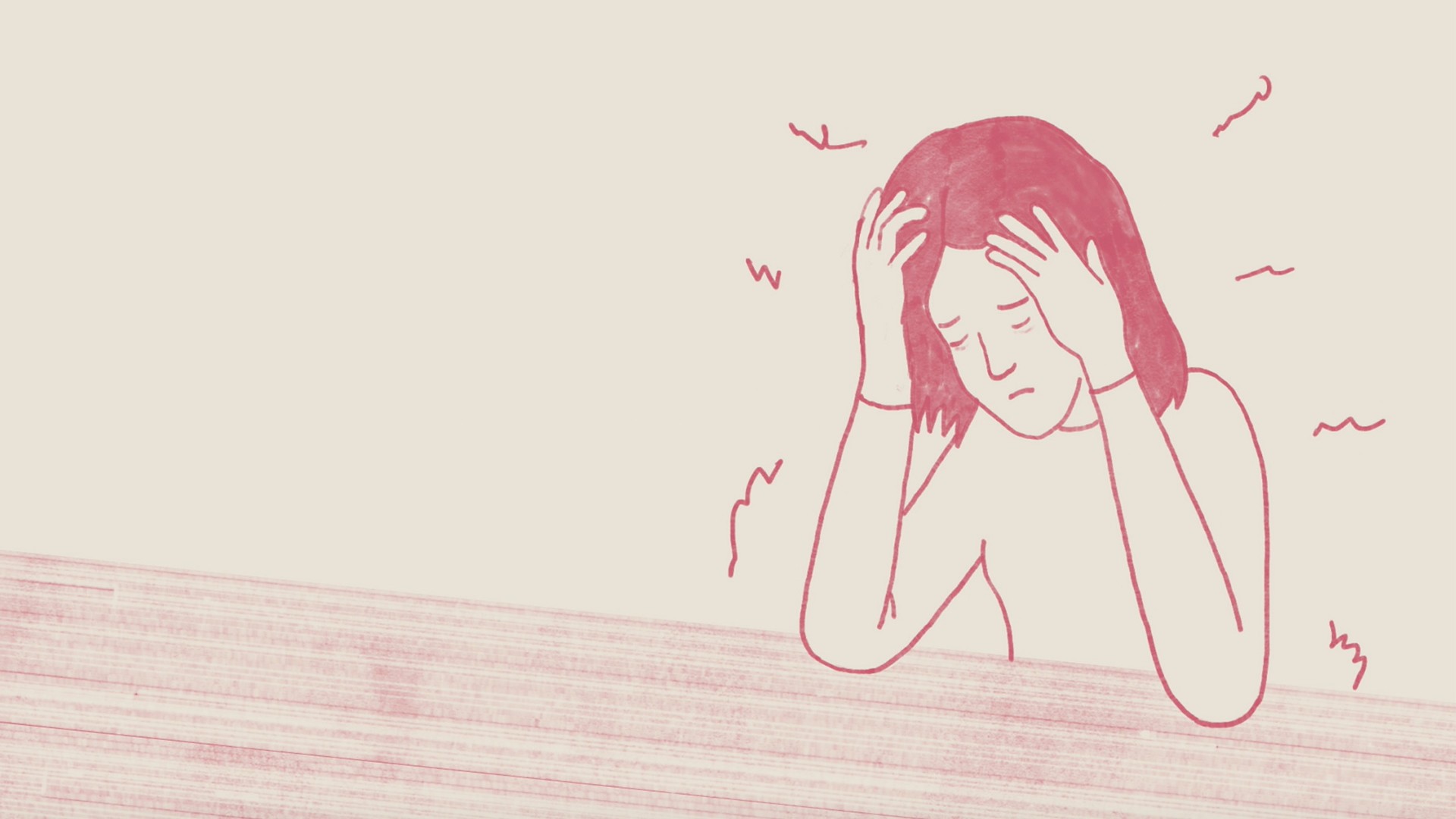This article originally appeared on VICE Brazil.I was almost 11 years old when the first lump appeared on my scalp—a large one, a kind of strange thing. My mother took me to a few [different] doctors. I went to the pediatrician, to the emergency room, and to the dermatologist; they thought that it could be a cyst. Nobody knew, in fact. They even thought it could be a bot—that bug that lodges in the skin. A dermatologist suggested that I should undergo surgery to remove the lump and a biopsy afterwards to check what it was. Until that moment, I'd had a common and very healthy childhood. I'd never had a serious illness or even taken antibiotics.
Advertisement
I was born and live in São Paulo, Brazil, an only daughter, and my parents were actors. I've always had friends, but I was a kid that lived among adults. Today, I'm 27 years old. I'm rehearsing a play directed by Antunes Filho at CPT (Center of Theater Research). I do television, cinema, theater, and advertising work [in Brazil].
At the time, I didn't have any symptoms. No pain, tiredness, fatigue, cough, or anything. I remember my mother was very apprehensive and scared. I was directed to undergo a surgery with a plastic surgeon. It was done and, after a week, I went with my parents to remove the stitches and get the result of the biopsy, which exhibited malignant cells. It was cancer.It was a surprise because I had no symptoms, and I was still just a child. Nobody expected that a kid would have such a grave disease."I'd never had a serious illness or even taken antibiotics."
My mother called the insurance company, which referred us to a pediatric oncology clinic. When I arrived there, a specialist examined me and saw that there were two more lumps: One behind the ear, on the same side of the head where the first one had appeared, and another one on my neck. My father was baffled and said, "I'm going to the bathroom." He stood up and fainted. He was in shock. It was very scary.Maybe I didn't panic because I was a kid without any health issues up to that point, but I didn't get scared. I just thought, "Well, I'll get treated and get better."
Advertisement
I spent a week taking a bunch of tests that indicated I had non-Hodgkin's lymphoma, which is a cancer of the lymph nodes. But I didn't even have swollen lymph nodes, which is a classic symptom.This kind of lymphoma generally appears in the stomach, liver, or spleen. It's normally inside the abdomen, inside of the body. But not mine—mine appeared externally. Which, on the one hand was good, because it was discovered soon.
More From Tonic:
Everything was said in front of me. Everything was explained in full detail. At no point was there a private conversation between my doctors and my parents. I knew about everything: How it would go, what it was, and what it wasn't. I understood the gravity [of it all]—I knew it was a serious disease, but I believed I was going to get better. I didn't think I was going to die, even because I only felt sick when I started the treatment, which is very aggressive, especially when a child undergoes it, because they have a faster metabolism and everything is still under development.It was during the treatment that I started to feel bad, and feel like a sick person. I had to have several blood transfusions because chemo is a poison; it messes with the blood cells. I started to have anemia and eating better wouldn't solve it; I had to do the transfusions instead. But I understood that this was part of the treatment. I remember my parents' friends being very worried about me, giving me gifts, trying to please me, the same with my aunts. Sometimes it made me think, "Gosh, I'm going through something really serious."
People always ask me, "Did you do chemo? Did you shave your hair?" I remember that when the doctor said the treatment consisted of chemotherapy I started to cry, because I didn't want to lose my hair. Then I told my parents, "Oh, the hair is the least [of my concerns].""I didn't think I was going to die."
More From Tonic:

Everything was said in front of me. Everything was explained in full detail. At no point was there a private conversation between my doctors and my parents. I knew about everything: How it would go, what it was, and what it wasn't. I understood the gravity [of it all]—I knew it was a serious disease, but I believed I was going to get better. I didn't think I was going to die, even because I only felt sick when I started the treatment, which is very aggressive, especially when a child undergoes it, because they have a faster metabolism and everything is still under development.It was during the treatment that I started to feel bad, and feel like a sick person. I had to have several blood transfusions because chemo is a poison; it messes with the blood cells. I started to have anemia and eating better wouldn't solve it; I had to do the transfusions instead. But I understood that this was part of the treatment. I remember my parents' friends being very worried about me, giving me gifts, trying to please me, the same with my aunts. Sometimes it made me think, "Gosh, I'm going through something really serious."
Advertisement
At a certain point, I was really anemic. My hemoglobin reached a very low level. We were in the clinic's elevator on the way to a blood transfusion, and I fainted. That was a little shocking.Everything was a bit upsetting. The nausea, feeling ill, sitting in a chair for hours getting that stuff into your veins. The doctors didn't want to use a catheter on me because I'd have to get a surgery to insert it and then another one to remove it. They thought that it wasn't worth it in my case. So, every week, they had to find a new vein and do the blood test. It was always on Sundays. On Mondays, I took the medication. In other words, they had to pick a vein twice a week. There's a moment where you can't find more of them, so it was difficult; it hurt.Your immune system gets really weak with the chemo. I had mumps and kidney stones. But they weren't related and didn't change anything. And chemo gave me a lot of cold sores.At the time, I really liked Japanese food but I wasn't able to eat raw foods. I couldn't swim in a pool or in the ocean, or sunbathe. I had to be very careful not to get an infection, so I couldn't even have my nails done. Those things bothered me. Not only was I not allowed to swim during the treatment, but for two years after the fact, and that was something I really wanted to do. It didn't make me cry or anything, but I wanted it badly. I also wanted my hair to grow back.
Advertisement
The prognoses were always very positive. Right after the first [chemo] sessions, the two lumps disappeared. I had a lot of luck, maybe because I'd discovered it in the beginning. But in the clinic where I was doing the treatment, the disease reappeared in some children or was resilient enough that it wouldn't go away.
I kept going to school. I missed a lot of classes due to the treatment, but my mother did as much as possible to keep that from happening. I graduated onto the next grade, and I didn't fail or anything. I remember people were kind of curious about me. "Oh, that kid who's sick and undergoing treatment." That was a little upsetting, but nothing that deeply affected me. Two years later, I ended up changing schools and didn't tell anyone I'd had the disease because I didn't want to be stigmatized. It's not something I hide, but at the time I didn't want the stigma of being a "burdensome" child who suffered. I didn't want it. I wanted to be a light child, a kid. And because I'd [spent most of my time] around adults, I had a more mature nature.As much as I've lived a normal life, given the circumstances, I also felt that a part of my childhood had been lost. It was a moment of transition. I remember I started having periods before the treatment, but they stopped right after [I'd started it]. It was a moment where my body was changing. I had to take corticosteroids and I became very swollen; my body was different. There were too many transformations happening at the same time."At the time, I didn't want the stigma of being a 'burdensome' child who suffered."
Advertisement
The treatment was supposed to last four months but due to these complications, it ended up taking six months. Afterwards, I spent two more years taking oral medication.I didn't have any fear. I didn't. At no point did it cross my mind that I might die. I started having more of an awareness of the gravity of it all when I was a teenager, years later. It started dawning on me, "I had a very serious illness when I was a child. What if it comes back? What if it happens again? Would I have to go through that whole treatment once more?"I even had to go to therapy. I started developing a certain panic that the disease would come back. I became a hypochondriac; I'd go to the doctor all the time and think I was sick; I kept searching for lumps in my head, in my neck. I took a bunch of tests. I went through a certain period where I was very neurotic and paranoid about the fact that the disease could come back.But it never did. I don't complain from having been sick. Of course it's something I wouldn't want to go through again, but I think I learned things, grew up, and went through things that other children didn't. I developed an inner strength, even if it was on a very subconscious level. It shaped my personality and prepared me for other things I would experience later in life.Read This Next: What It's Like to Have Stage IV Cancer in Your 30s"I started developing a certain panic about having the disease again. I became a hypochondriac; I'd go to the doctor all the time and think I was sick."
